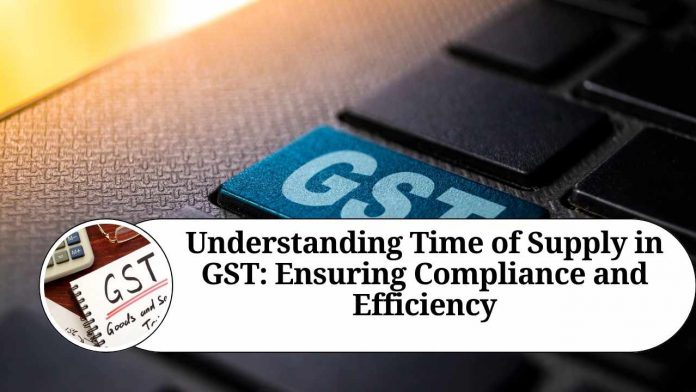Introduction
The implementation of Goods and Services Tax (GST) has revolutionized the taxation system in many countries, including India. One of the critical aspects of GST is the determination of the “Time of Supply.” It refers to the point in time when goods or services are considered to be supplied, which determines the applicable tax rate, the issuance of invoices, and the filing of returns. Understanding the concept of Time of Supply is crucial for businesses to ensure compliance with GST regulations and maintain efficient operations. In this blog, we will delve into the intricacies of Time of Supply and explore its significance in the GST framework.
Defining Time of Supply:
Time of Supply is the point in time when a transaction becomes liable for the levy of GST. It is determined differently for goods and services, as prescribed under the GST laws. The significance of Time of Supply lies in its role in determining the taxable event and the applicable tax rate.
Time of Supply for Goods:
For goods, the Time of Supply is determined based on the earliest of the following dates: a) The date of the issuance of the invoice by the supplier or the last date on which the invoice should have been issued. b) The date of receipt of payment by the supplier. c) The date on which the goods are delivered or made available to the recipient. d) The date of the entry in the books of accounts of the supplier.
Understanding these factors is crucial for businesses, as it helps them determine when they need to issue invoices, receive payments, and record transactions to comply with GST regulations accurately.
Time of Supply for Services:
For services, the Time of Supply is determined based on the earliest of the following dates: a) The date of the issuance of the invoice by the supplier or the last date on which the invoice should have been issued. b) The date of receipt of payment by the supplier. c) The date on which the service is completed or provided, as per the terms of the contract. d) The date of the entry in the books of accounts of the supplier.
Businesses providing services must carefully evaluate these factors to determine the correct Time of Supply and ensure accurate invoicing, payment collection, and recording of transactions.
Importance of Time of Supply:
Understanding and complying with the Time of Supply provisions in GST is essential for several reasons: a) Accurate Tax Calculation: The correct determination of the Time of Supply ensures that businesses apply the appropriate tax rate and avoid under or overpayment of taxes. b) Timely Issuance of Invoices: Knowing when to issue invoices helps businesses maintain proper documentation, facilitate smooth transactions, and meet compliance requirements. c) Filing of Returns: Time of Supply is crucial for filing GST returns accurately and on time, avoiding penalties or legal consequences. d) Cash Flow Management: By aligning invoicing and payment collection with the Time of Supply, businesses can effectively manage their cash flows and optimize working capital.
Challenges and Solutions:
Determining the Time of Supply can be challenging, especially in complex business scenarios involving advance payments, change in rates, or continuous supplies. However, businesses can overcome these challenges through proper record-keeping, robust accounting systems, and staying updated with the latest GST regulations. Utilizing technology solutions, such as GST software or consulting with tax professionals, can also provide assistance in ensuring compliance with Time of Supply provisions.
Conclusion
The concept of Time of Supply plays a critical role in the GST framework and requires careful consideration by businesses. Understanding the specific rules for goods and services, accurately determining the point of supply, and adhering to compliance requirements are vital for efficient operations and seamless GST compliance.
Other Related Blogs: Section 144B Income Tax Act
Frequently Asked Questions (FAQs)
Q. What is Time of Supply in GST?
Time of Supply refers to the point in time when goods or services are deemed to be supplied, determining the applicable tax rate and compliance requirements under the GST framework.
Q. How is the Time of Supply determined for goods?
For goods, the Time of Supply is determined based on the earliest of the following dates: the issuance of the invoice, receipt of payment, delivery of goods, or entry in the supplier’s books of accounts.
Q. How is the Time of Supply determined for services?
For services, the Time of Supply is determined based on the earliest of the following dates: the issuance of the invoice, receipt of payment, completion/provision of services as per the contract, or entry in the supplier’s books of accounts.
Q. Why is understanding the Time of Supply important for businesses?
Understanding the Time of Supply is crucial for businesses as it helps determine the correct tax rate, issue invoices on time, manage cash flows, and comply with GST regulations while filing returns accurately.
Q. What happens if the Time of Supply is determined incorrectly?
Incorrect determination of the Time of Supply may lead to incorrect tax calculations, delayed or inaccurate invoicing, non-compliance with GST regulations, and potential penalties or legal consequences.
Q. How does the Time of Supply affect the filing of GST returns?
The Time of Supply is crucial for filing GST returns accurately and on time. It determines the period in which the transaction should be reported, and the applicable tax liability should be accounted for.
Q. Are there any special provisions for continuous supplies or change in rates?
Yes, special provisions exist for continuous supplies and changes in tax rates. In the case of continuous supplies, the Time of Supply is determined based on the earlier of specific events or regular intervals. For changes in tax rates, the Time of Supply is determined based on the date of change.
Q. What are the challenges businesses may face in determining the Time of Supply?
Some challenges include managing advance payments, dealing with complex transactions, handling delayed payments, and staying updated with frequent changes in GST regulations.
Q. How can businesses ensure compliance with Time of Supply provisions?
Businesses can ensure compliance by maintaining accurate records, utilizing robust accounting systems, adopting technology solutions like GST software, and seeking guidance from tax professionals when needed.
Q. Is it advisable for businesses to consult with tax professionals regarding Time of Supply?
Yes, consulting with tax professionals can be beneficial, especially in complex business scenarios. They can provide guidance, help interpret GST regulations, and ensure accurate determination of the Time of Supply to avoid compliance issues.




















